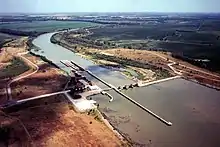Newt Graham Lock & Dam
Newt Graham Lock & Dam (also known as Newt Graham Lock and Dam 18, Newt Graham Lake, Newt Graham Reservoir and Newt Graham Pool.)[1] is the final lock and dam of the McClellan-Kerr Arkansas River Navigation System (MKARNS) before reaching the western terminus, Tulsa Port of Catoosa on the Verdigris River. The lock and dam is 24.8 miles (39.9 km) downstream of the port.[2]
| Newt Graham Lock and Dam (#18) | |
|---|---|
 Newt Graham Lock and Dam on the Verdigris River looking south. March 3, 1999. U.S. Army Corps of Engineers Digital Visual Library. | |
| Coordinates | 36.0588°N 95.5376°W |
| Purpose | Navigation |
| Construction began | 1967 |
| Opening date | 1970 |
| Built by | U.S. Army Corps of Engineers |
| Operator(s) | U.S. Army Corps of Engineers |
| Dam and spillways | |
| Impounds | Verdigris River |
| Reservoir | |
| Creates | Newt Graham Reservoir |
| Total capacity | 24,260 acre feet (29,920,000 m3)[1] |
| Surface area | 1,490 acres (6,000,000 m2)[1] |
| Normal elevation | 532 feet (162 m)[1] |
Nearby cities and towns
The Newt Graham Lock & Dam is approximately 7 miles (11 km) south of Inola, Oklahoma.[3]
- Broken Arrow, Oklahoma is 5 miles (8.0 km) due west.[1]
- Wagoner, Oklahoma is 25 miles (40 km) southeast.[1]
- Pryor, Oklahoma is 25 miles (40 km) northeast.[1]
Construction started in 1967 and was completed in 1970. Estimated cost of the project was $43.4 million.
Recreation
Fishing and Hunting
The waters around Newt Graham Lock & Dam have a plentiful supply of fish. People who wish to fish must have current Oklahoma fishing licenses. The most common species are: largemouth bass, striped bass, crappie, channel catfish, flatheads and sunfish.[4]
The U.S. Army Corps of Engineers manages two boat landings on the Lock 18 Pool: Bluff Landing and Highway 33 Landing. Camping is allowed only at Bluff Landing, where camping and day use fees are collected. Camping is prohibited at Highway 33 Landing, which is limited to boat launching and day use. Boat launching is free at this landing.[4] There are 25 campsites with electrical hookups and 7 without. Campsites are open year-round.[5]
Hunting in the area around the Lock 18 Pool is governed by the same Federal and state laws and regulations as elsewhere in Oklahoma. License requirements are also the same. Popular species for hunters here are: whitetail deer, dove, quail, squirrel, rabbit, turkey and several species of migratory waterfowl.[5]
References
- "Newt Graham Lock and Dam, Oklahoma, USA." Lake Lubbers.com. 2017 Accessed June 3, 2017.
- Townsend, Jay. "5 Oklahoma Locks and Dams on the Ark. River Navigation System." U.S. Army Corps of Engineers Southwestern Division. November 10, 2016. Accessed June 3, 2017.
- U.S. Army Corps of Engineers. "Welcome to New Graham Lock and Dam." Accessed June 3, 2017.
- "Newt Graham Recreation." July 30, 2017
- "Newt Graham Lock and Dam 18." Oh Ranger.com. Accessed July 30, 2017.